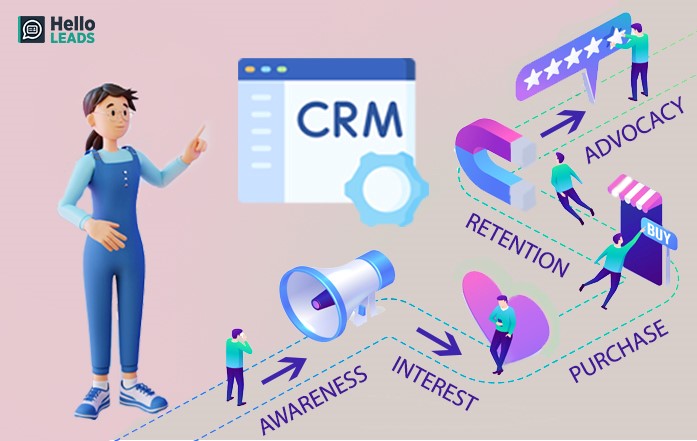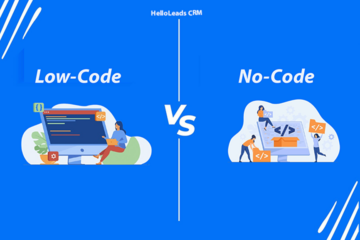
The customer journey is the lifeblood of any company hoping to thrive in the digital age. By gaining a deeper understanding of how customers interact with your brand, you can optimize your marketing efforts and create a more streamlined experience that is aligned with their interests and needs. The customer journey also provides insight into how your customers move through various stages of engagement. All this data can help you uncover hidden opportunities to drive the adoption of new features or products, identify pain points, and target user segments for focused marketing campaigns.
In this small business guide, we will walk you through how a CRM helps in the customer journey.
Determining where customers are in the Journey
The first step to understanding your customer journey is determining where your customers are in the customer lifecycle. Using a CRM, you can visualize this data in a marketing funnel chart, where each stage represents a different part of the conversion process. Having a clear view of where your customers are in the customer journey will help you understand how to optimize your efforts for increased conversion and sales.
Ideally, there are 3 levels of customer sales/service
- Level 1 is the initial customer. This is the primary foundation of any business or organization
- Level 2 represents repeat customers. These customers develop greater economic and emotional ties with you
- Level 3 represents those clients who are not merely content with your services but also want to do business with you again. These customers actively tell others about their positive experiences and spread the word
This segmentation via collecting and analyzing the collected information allows you to gain insight into specific groups within your customers — their behavior, needs, and preference.
Understanding customer behavior

Understanding why customers behave the way they do will help you discover new insights that can inform your marketing strategies and enhance customer experiences. By collecting data from surveys and adding it to your CRM, you can gain valuable insight into the problems that your customers are trying to solve. This CRM data can help you create more relevant content and offers, and ultimately drive higher conversion. When choosing what questions to ask, focus on information that will add value to your customers and will help you achieve your business goals. Some sample questions to consider include:
What are your biggest challenges with your product/service?
What solutions are you currently using to overcome these challenges?
Are these solutions good or bad? What are the pros and cons?
What would you like to see in a new product/service?
Creating a holistic image of a consumer is intended to help businesses better target their sales and marketing initiatives. The information that businesses use to create this picture may originate from direct sales calls, analytics based on previous consumer behavior, and outside sources. The efficient collection and arrangement of a substantial data set is an extension of predictive models of client purchase habits.
Practically speaking, customer centricity could take the form of a process discipline, such as swiftly inserting a new business card, taking full meeting notes, and notifying the marketing team of the new contact. It is the distinction between understanding the things that a customer purchases and the reasons behind those purchases. Firms will be able to make wise judgments if they have this information.
Tracking Ad Effectiveness

Ad effectiveness is the number of conversions that come from each ad. Knowing this rate will help you determine which ads are driving the most customers, and will allow you to scale accordingly. By tracking ad effectiveness in your sales CRM, you will be able to easily determine which ads are driving the most customers and make adjustments as needed. Armed with this customer knowledge, marketing initiatives are more effective at attracting both brand-new clients and expanding their share of wallets with existing clients. Customer interactions that are based on a thorough knowledge of the customer’s preferences are more enjoyable. This will require you to record the number of views each ad receives and the number of conversions it generates.
A business that wants to get a broad picture of how consumers interact with its brand must go beyond the information it provides and the interactions it controls (through conventional media, email, websites, telephone services) and in-person physical sales venues), but it also needs to recognize and consider all other direct or indirect contacts with customers. For this reason, social listening studies with the help of CRM data (which examine the flow of testimonials and various types of remarks concerning the company’s presence on social networks) have increased dramatically in recent years. This is another reason why brands today collaborate and work with influencers to make sure that the conversation they miss remains positive.
Detecting Churn Risk
Churn risk is the likelihood that a customer will stop using your product or service. It is important to identify customers at risk of churning so that you can take action to retain them before they leave. By tracking customer purchase history, billing information, and more in your CRM, you can better detect customers at risk of churning. You can then take action to retain these customers through personalized outreach, special offers, or an additional service.
Depending on your objectives and resources, one of the various model churn prevention strategies may be the greatest fit for your company.
A more straightforward top-down strategy, like the RFM model (Recency, Frequency, and Monetary), can frequently be used to generate a static, one-time analysis of turnover that aims to advise leadership. With the aid of survival models, it is possible to score clients in real-time which is more dynamic and takes censoring into consideration.
Start with a basic RFM model for businesses that are just starting to evaluate customer churn and require an “MVP” solution (Minimum Viable Product). As your model is used more frequently, you can add sophistication and scalability.
Businesses that prioritize customer success simply see less attrition and greater upsell, which results in quicker growth. Additionally, happy clients serve as references and champions for bringing in more business. In the long run, new businesses cannot completely offset the leaky bucket effect of churn.
Conclusion
When generalized customer data is deliberately gathered, you can target potential new customers using segmented data. If you have easy access to client preference data, you can design improved in-person, phone, and online customer support interactions. Additionally, you can deepen the customer relationship when information regarding new or evolving client needs is gathered. CRM is your most effective tool for building, sustaining, and extending customer connections, and it’s here to stay.
Share this blog :












